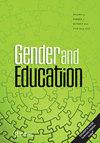What do we know about how women with forced migration experiences access tertiary education in resettlement contexts? A scoping study
IF 1.9
3区 教育学
Q2 EDUCATION & EDUCATIONAL RESEARCH
引用次数: 5
Abstract
ABSTRACT There has been a growth of scholarly interest in the experiences of people with refugee and asylum seeker backgrounds as they seek to access tertiary education in resettlement. While gender is frequently identified as a key factor that impacts equitable participation in tertiary studies, the educational challenges for women with forced migration experiences (WFME) are often incidentally identified, rather than a targeted focus of inquiry. Here, we map the scholarly literature that explicitly focuses on the tertiary educational experiences of WFME, using a scoping study methodology (Arksey and O’Malley 2005) to explore current understandings and suggest future research directions. In analysing WFME-focused literature spanning the last ten years, we consider what is known about the barriers and facilitators to engagement, and the ways in which gendered experiences intersect with issues of language, culture, and socioeconomic and visa status to create particular constellations of gendered disadvantage that are specific to WFME.我们对有被迫移民经历的妇女在重新安置环境中如何获得高等教育了解多少?范围界定研究
摘要具有难民和寻求庇护者背景的人在重新安置过程中寻求接受高等教育的经历引起了学术界的兴趣。虽然性别经常被认为是影响公平参与高等教育的一个关键因素,但有强迫移民经历的妇女面临的教育挑战往往是偶然发现的,而不是有针对性的调查重点。在这里,我们绘制了明确关注WFME高等教育经历的学术文献,使用范围界定研究方法(Arksey和O'Malley,2005)来探索当前的理解并提出未来的研究方向。在分析过去十年中以WFME为重点的文献时,我们考虑了对参与的障碍和促进因素的了解,以及性别经历与语言、文化、社会经济和签证地位问题的交叉方式,以创造WFME特有的性别劣势。
本文章由计算机程序翻译,如有差异,请以英文原文为准。
求助全文
约1分钟内获得全文
求助全文
来源期刊

Gender and Education
EDUCATION & EDUCATIONAL RESEARCH-
CiteScore
5.20
自引率
9.10%
发文量
31
期刊介绍:
Gender and Education grew out of feminist politics and a social justice agenda and is committed to developing multi-disciplinary and critical discussions of gender and education. The journal is particularly interested in the place of gender in relation to other key differences and seeks to further feminist knowledge, philosophies, theory, action and debate. The Editors are actively committed to making the journal an interactive platform that includes global perspectives on education, gender and culture. Submissions to the journal should examine and theorize the interrelated experiences of gendered subjects including women, girls, men, boys, and gender-diverse individuals. Papers should consider how gender shapes and is shaped by other social, cultural, discursive, affective and material dimensions of difference. Gender and Education expects articles to engage in feminist debate, to draw upon a range of theoretical frameworks and to go beyond simple descriptions. Education is interpreted in a broad sense to cover both formal and informal aspects, including pre-school, primary, and secondary education; families and youth cultures inside and outside schools; adult, community, further and higher education; vocational education and training; media education; and parental education.
 求助内容:
求助内容: 应助结果提醒方式:
应助结果提醒方式:


